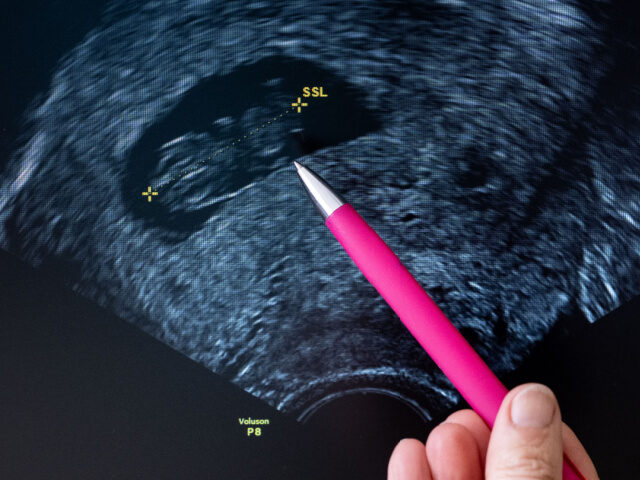A Georgia judge overturned the state’s six-week abortion restriction, prompting Attorney General Chris Carr to appeal the decision to the state Supreme Court.
Fulton County Superior Court Judge Robert McBurney blocked the LIFE Act on September 30, calling it unconstitutional and siding with pro-abortion opponents to the restriction. McBurney, who was appointed in 2012 by former Republican Georgia Gov. Nathan Deal, wrote that his “interpretations of ‘liberty'” under the state and federal Supreme Courts “demonstrates that liberty in Georgia includes in its meaning, in its protections, and in its bundle of rights the power of a woman to control her own body, to decide what happens to it and in it, and to reject state interference with her healthcare choices.”
“That power is not, however, unlimited,” McBurney continued. “When a fetus growing inside a woman reaches viability, when society can assume care and responsibility for that separate life, then — and only then — may society intervene.”
The Living Infants Fairness and Equality (LIFE) Act was signed into law in 2019 by Georgia Gov. Brian Kemp (R) and went into effect in 2022 after the Supreme Court overturned Roe v. Wade and returned the issue of abortion to individual states. The law prohibits abortions in the state after a heartbeat is detected, usually at about six weeks of pregnancy. Cases of rape, incest, or if the life of the mother is in danger are exceptions to the law.
McBurney further wrote, “[D]oes a Georgian’s right to liberty of privacy encompass the right to make personal healthcare decisions? Plainly it does.”
“[F]or many women, their pregnancy was unintended, unexpected, and often unknown until well after the embryonic heartbeat began. Yet that’s too late under the LIFE Act’s strictures: these women are now forbidden from undoing that life-altering change of circumstances — before they even knew the change had occurred,” he continued:
For these women, the liberty of privacy means that they alone should choose whether they serve as human incubators for the five months leading up to viability. It is not for a legislator, a judge, or a Commander from The Handmaid’s Tale to tell these women what to do with their bodies during this period when the fetus cannot survive outside the womb any more so than society could — or should — force them to serve as a human tissue bank or to give up a kidney for the benefit of another.
The case stems from a lawsuit filed by SisterSong Women of Color Reproductive Justice Collective and other plaintiffs in 2019 after Kemp signed the restriction into law. In 2022, McBurney notably struck down the restriction, making the most recent ruling the second time he has blocked the law. The Supreme Court reversed his 2022 ruling and allowed the law to remain in effect while the merits of the restriction were considered.
This week, Georgia Attorney General Chris Carr appealed the ruling to the state Supreme Court, arguing that high court is “all but certain to reverse this barely veiled judicial policymaking.”
“[T]he superior court’s new order is just as erroneous as its first. Though rife with political arguments, irrelevant (and erroneous) legal tangents, and ad hominem attacks, the superior court’s opinion never comes close to identifying a genuine constitutional flaw in the LIFE Act,” the state argued, represented by Washington, DC, law firm Schaerr Jaffe.
“The harm to the State and the public is significant and irreparable, as unborn children are at risk every day that the injunction continues. This Court granted a stay in nearly identical circumstances two years ago, and it should do the same here,” the appeal reads.
“Abortion is and has been a highly contentious issue for decades, yet never have the people of Georgia amended their constitution to so much as mention it,” the appeal continues. “That a single superior court judge has strong policy views on the subject does not transform abortion into an issue of privacy.”
Ambassador Ken Blackwell, senior fellow for Human Rights and Constitutional Governance at the Family Research Council, exclusively told Breitbart News that McBurney’s ruling is “election interference.”
“Judge McBurney has been sitting on this case for three years since the trial and now issues a pro-abortion decision that contradicts Georgia law just as balloting begins in a key battleground state,” Blackwell said.
“With his October Surprise, it looks like McBurney is attempting to curry favor with Kamala Harris to get appointed to a lifetime federal judgeship if Harris wins the presidency,” he added. “It’s a reminder to voters that Harris will stack the federal bench with judges who overthrow the plain wording of laws to fit the judge’s political agenda, while Georgia voters want judges who will follow the law as written and leave lawmaking to legislators.”
The case is Georgia v. SisterSong Women of Color Reproductive Justice Collective, No. 2022-cv-367796, in the Superior Court of Fulton County, Georgia.
Katherine Hamilton is a political reporter for Breitbart News. You can follow her on X @thekat_hamilton.

COMMENTS
Please let us know if you're having issues with commenting.